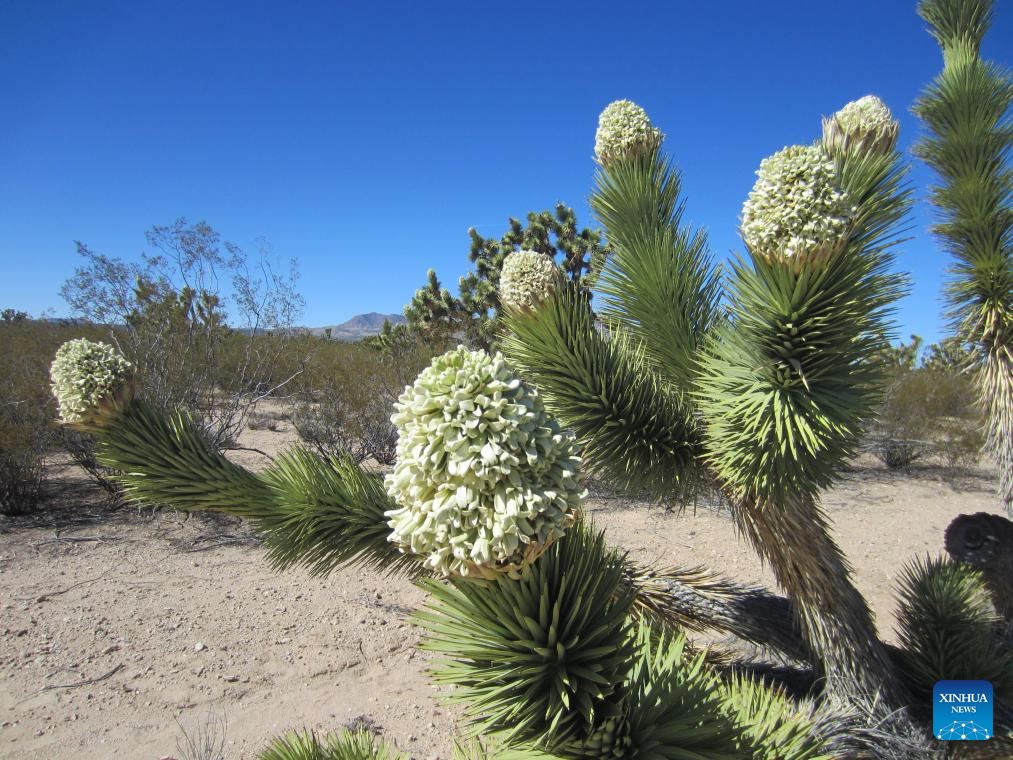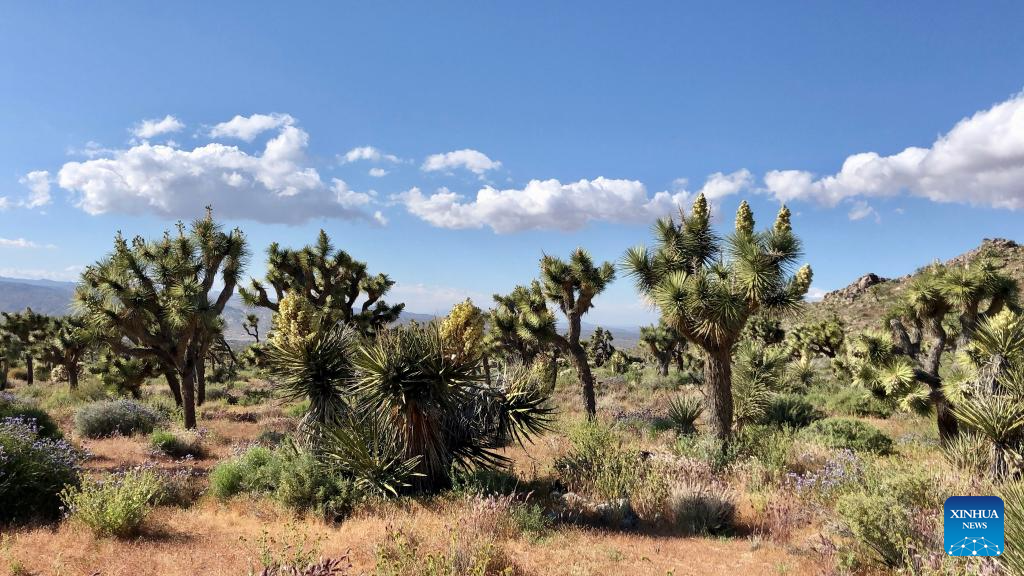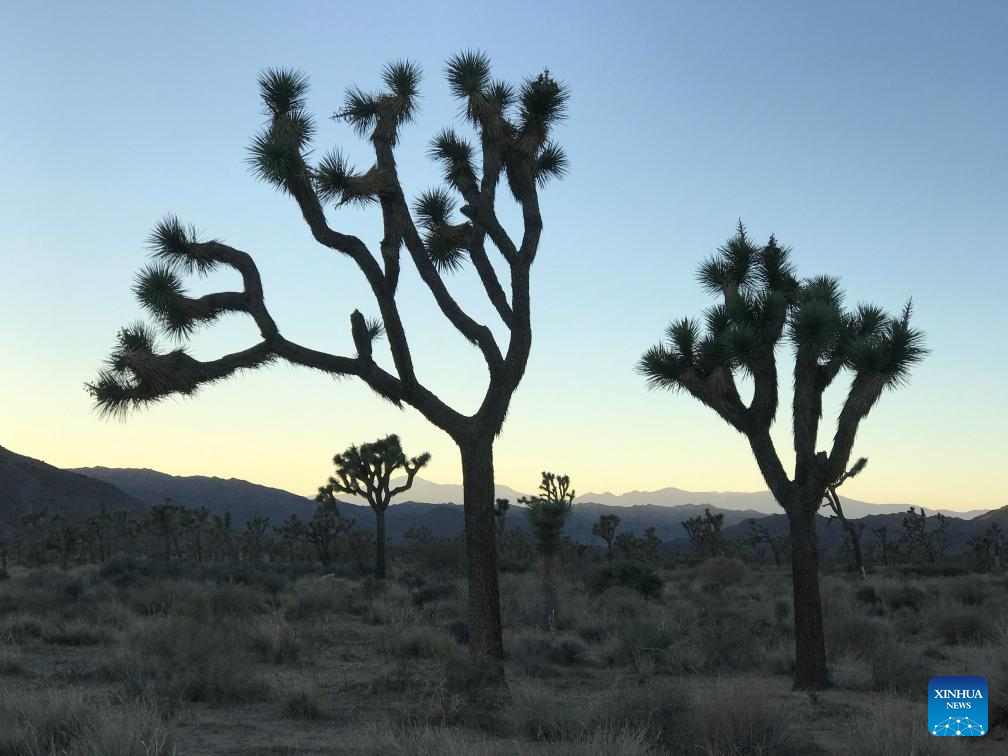
Kelly Herbinson, Co-Executive Director of the Mojave Desert Land Trust, speaks during an interview in Ventura, California, the United States, on July 18, 2023. The Joshua trees, an integral part of California's Mojave Desert landscape, with their characteristic spiky leaves and unique branches, are locked in a desperate battle for survival. Increasingly severe droughts driven by climate change, habitat fragmentation due to expanding residential and commercial real estate development, and heightened wildfires all pose dire threats to this iconic and enduring symbol of the U.S. West. (Photo by Zeng Hui/Xinhua)
by Julia Pierrepont III, Gao Shan
LOS ANGELES, July 21 (Xinhua) -- The Joshua trees, an integral part of California's Mojave Desert landscape, with their characteristic spiky leaves and unique branches, are locked in a desperate battle for survival. Increasingly severe droughts driven by climate change, habitat fragmentation due to expanding residential and commercial real estate development, and heightened wildfires all pose dire threats to this iconic and enduring symbol of the U.S. West.
"There are desert and arid ecosystems all over the planet facing similar issues, including in China," Kelly Herbinson, Co-Executive Director of the Mojave Desert Land Trust, told Xinhua in a recent interview, noting that the international community should work together to deal with climate change.
She pointed out that as the effects of climate change become increasingly apparent, the collaboration of groups around the globe is also growing in importance.
"I'm really looking forward to working with scientists all over the world who are dealing with similar issues and come up together with some solutions," she added, noting that "we don't have much time. Things are changing really fast and the species really is up against a difficult road ahead."
Joshua tree is a species of desert Yucca plant that can tower up to 70 feet tall. They are considered one of the desert's most valuable "apartment buildings," hosting a variety of desert life that use them for shelter and food, including owls, woodpeckers, various birds, lizards, wood rats, moths and beetles - all important parts of the natural ecosystem.
"Joshua tree is sort of ambassador species for our region," Herbinson explained. "It lives nowhere else on the planet but here in our desert region. And it is particularly sensitive to climate change."
As mega-drought continues to take its toll, Joshua trees are under threat. But the desert's signature silhouette isn't going down without a fight and has found allies in lawmakers, philanthropic donors, community groups, and conservation groups, like the Mojave Desert Land Trust.
The Mojave Desert Land Trust is a non-profit organization formed in 2006 by a group of devoted conservationists and donors dedicated to the protection and preservation of the ecologically diverse desert areas of California's 26-million acre Mojave Desert - especially the at-risk Joshua trees - and the Mojave's scenic and cultural resources that are under escalating threat from climate change and human activities.
The organization achieves its goals through acquiring land and conservation easements, promoting awareness about desert conservation, collaborating with other organizations, serving as expert advisors to government officials, and engaging the public through educational programs and volunteer opportunities.
Herbinson described the ailing Joshua trees as brown "Zombie forests," which are seemingly alive but struggling to survive and reproduce, with their natural vibrancy now reduced to mere hints of green.
In response to these pressing concerns, California's legislature took a unique and pioneering approach to Joshua tree conservation last week.
After a protracted debate and unsuccessful attempts to list the Joshua tree as an endangered species (an approach that met with resistance from business interests and solar farms), lawmakers formulated a more practical, compromise plan that balanced considerations for economic growth and the need for greater renewable energy development with ecological preservation.
That plan, The Western Joshua Tree Conservation Act, has been passed into law in California.
"We are thrilled to see that the state took steps and come up with a creative solution to a really difficult problem," Herbinson told Xinhua.
The new legislation requires companies to secure a permit before they can cut down or relocate Joshua trees, providing a layer of protection that was previously nonexistent. It also mandates the creation of a conservation plan aimed at ensuring the Joshua trees' survival along with the establishment of a dedicated conservation fund derived from permit fees and fines levied for disturbing Joshua trees without a permit.
As a frontrunner in environmental policies, California has long been a national leader in combating climate change, reducing greenhouse gas emissions, and establishing legal protections for various habitats and species.
Herbinson also pointed out that there are lots of ways that countries can work together to deal with climate change and mused that an international conservation summit might be the right place to get the ball rolling for effective people-to-people exchanges.
"It's not just our leaders who need to talk. It's all of us who need to talk," she said, especially the people with their boots on the ground doing the hard work of conservation who go out every day to make it happen.
"Around the world, we have so much to learn from each other. We would love to be partnering with groups in China to come up with innovative solutions to the similar problems confronting us all," Herbinson concluded.

The undated photo shows Joshua trees in the Mojave Desert. The Joshua trees, an integral part of California's Mojave Desert landscape, with their characteristic spiky leaves and unique branches, are locked in a desperate battle for survival. Increasingly severe droughts driven by climate change, habitat fragmentation due to expanding residential and commercial real estate development, and heightened wildfires all pose dire threats to this iconic and enduring symbol of the U.S. West. (The Mojave Desert Land Trust/Handout via Xinhua)

The undated photo shows Joshua trees in the Mojave Desert. The Joshua trees, an integral part of California's Mojave Desert landscape, with their characteristic spiky leaves and unique branches, are locked in a desperate battle for survival. Increasingly severe droughts driven by climate change, habitat fragmentation due to expanding residential and commercial real estate development, and heightened wildfires all pose dire threats to this iconic and enduring symbol of the U.S. West. (The Mojave Desert Land Trust/Handout via Xinhua)

The undated photo shows Joshua trees in the Mojave Desert. The Joshua trees, an integral part of California's Mojave Desert landscape, with their characteristic spiky leaves and unique branches, are locked in a desperate battle for survival. Increasingly severe droughts driven by climate change, habitat fragmentation due to expanding residential and commercial real estate development, and heightened wildfires all pose dire threats to this iconic and enduring symbol of the U.S. West. (The Mojave Desert Land Trust/Handout via Xinhua)

Kelly Herbinson, Co-Executive Director of the Mojave Desert Land Trust, speaks during an interview in Ventura, California, the United States, on July 18, 2023. The Joshua trees, an integral part of California's Mojave Desert landscape, with their characteristic spiky leaves and unique branches, are locked in a desperate battle for survival. Increasingly severe droughts driven by climate change, habitat fragmentation due to expanding residential and commercial real estate development, and heightened wildfires all pose dire threats to this iconic and enduring symbol of the U.S. West. (Photo by Zeng Hui/Xinhua)



